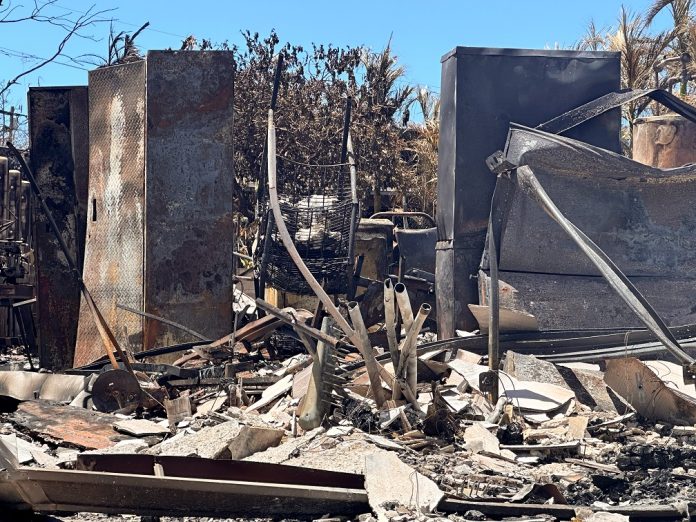Scott Hunter
Over 100 people have died, with many more still unaccounted for, as wildfires have raged across the island of Maui, Hawaii, making this recent disaster the deadliest wildfire in the United States in a century. Thousands more have been displaced, their homes burnt to the ground. The infrastructure of the island has been severely damaged, leaving many without electricity or other basic amenities.
The area of Hawaii affected by wildfires has quadrupled in recent decades, as the effects of profit-driven climate change have made the climate both hotter and drier. This recent disaster is the result of a ‘perfect storm’, where vegetation – desiccated by drought – caught light and the winds brought by Hurricane Dora over the Pacific spread the flames with unprecedented speed. The public services on the island were underequipped to deal with a fire on this scale. With only about 65 firefighters across the island and too few fire engines, they were especially unprepared for the fires to spread so quickly to urban areas.
Meanwhile, President Biden has already warned of a ‘long recovery’ for the island. Rebuilding alone is estimated to cost upwards of $5 billion. Already, displaced residents have reported receiving calls from ‘investors’ and property speculators offering to buy their land – of course, for a fraction of its worth. In Hawaii, land is at a premium and property developers make massive profits building holiday resorts with little to nothing going to local people.
Maui is not the only place to be affected by natural disasters this year. Record high temperatures have recently gripped Southern Europe and North Africa, which have experienced their own wildfires with Canada now joining them. The effects of the apocalyptic floods in Pakistan last year are still being felt by tens of millions. All throughout the world, the effects of climate change are becoming increasingly severe: extreme weather events and natural disasters are becoming more commonplace and are affecting places where they were previously unknown.
Not only is capitalism the driver of the climate change but it is also incapable of preparing adequately for the natural disasters that result from climate change. We have the science to tell us which areas are at risk of extreme weather but, in a world gripped by capitalist crisis, the world trend over the last few decades has been to cut public services. Driven by profit, the capitalist class – and the nation states they have built to serve their interests – will only maintain emergency services like firefighting and flood prevention at a ‘bare minimum’ level, enough to deal with the expected but unwilling to invest any more, with the logic that there’s no point in spending any more than they must ‘on the off chance’.
It is not any of the polluting companies or super-rich capitalists which will pay for this disaster, but the people of Maui, who face the prospect of losing their homes and livelihoods for years waiting for rebuilding, or selling their land at a fraction of its value to try and mitigate a little of their losses.
By nationalising the energy companies and big polluters, under democratic workers’ control, a rapid transition to renewable energy could be achieved, with retraining or alternative employment without loss of income for workers in fossil fuel industries. By taking the vast wealth off the super-rich and taking the commanding heights of the economy into democratic public ownership, public services could be fully funded not just for their day-to-day activities but to guard against the worst of natural disasters and mitigate as far as possible the existing effects of climate change. All the resources of the economy could be allocated according to need rather than greed, so areas affected by the fallout of climate change could recover swiftly with rebuilding efforts democratically controlled by local residents and trade unions. In short: we need socialist change to end climate change!







